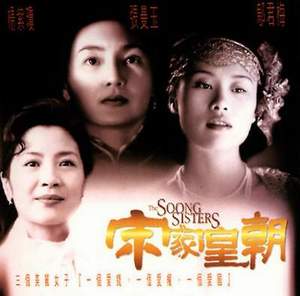
Hubby is in China at the moment and in his honor I decided to watch a Chinese (Mandarin) movie that I spied in the "Foreign Films" section in the library. I'm not sure why I picked this particular movie, "The Soong Sisters", after all I had never heard of them before, but I am so glad I did because this movie tells the story of pre-modern China - right from the revolution that overthrew the Qin dynasty in 1911 right up until when China became a Communist Nation in 1949- through the lives of the celebrated Soong sisters, daughters of Charlie Soong, American-educated Methodist minister and one of the main financiers of the 1949 Revolution and who made a fortune selling Bibles in China. Apparently this movie won a bunch of awards at the 1997 Hong Kong Film Festival.
PLOT DESCRIPTION
"Once upon a time in distant China, there were three sisters. One loved money, one loved power, and one loved her country." So opens this historical, melodramatic chronicle of the influential lives of three daughters from one of pre-Communist China's wealthiest families. Two of the Soong sisters married important figures in 20th-century Chinese history. Soong Ching-ling (played by Maggie Cheung) married Sun Yat-sen, who led the Chinese revolution that toppled the Qing dynasty in 1911 and became China's first president, while her sister Mei-ling (Vivian Wu) married Sun's successor, the famed Chiang Kai-shek. Chiang became president of China after Sun Yat-sen and had to deal with a nation thoroughly plundered by Western powers and by local Chinese warlords. His own government was corrupt and he was eventually defeated by the communists in 1949. Chiang and the Nationalists fled to Taiwan, where he remained president, a virtual dictator, till his death in 1975. The oldest daughter Ai-ling (Michelle Yeoh) married industrialist H.H. Kung, a wealthy and powerful man who eventually became Hong Kong's finance minister.
Most of my knowledge of modern China consists of Mao's rule and what came after..this little period between the end of the Qin Dynasty and Mao, with the Japanese invasion, the civil war between the Nationalists and the Communists, resulting in the Nationalists fleeing to Taiwan and the Communists taking over power, was never well known to me until now. But then again, I am wary about promoting this movie because, having been through strict Chinese censorship, I am sure this movie presents a very biased look at history with Chiang Kai-Shek and the youngest Soong daugher, Mei-Ling being depicted as the bad fellas and with Ching-Ling who was married to Sun-Yat Sen being the most likeable. Her politics were Left-leaning and she remained in China after the communists took over, eventually becoming honorary chairperson of the People's Republic. Not surprisingly, Soong Ching-ling was estranged from her two capitalist sisters. IMO, Mei-Ling was definitely the most fascinating and accomplished of the Soong sisters.
Why are people, including myself, so fascinated by the Soong Sisters? I guess it's because China being the patriarchal society that it is, it seems incongruous to have women at the helm, no doubt, in part it was the women's wealth and their connections that heralded them onto the world stage, but even so it was quite an achievement. Indira Gandhi, Corazon Aquino are also to be admired. Not sure why the US, this great respecter of women's rights and achievements should have taken so long to see a Condoleeza Rice.
For more fascinating reading on the Soong Sisters, go here

1 comment:
You could see the kow towing to the Communists in this movie. Sun Yat Sen was married with children when he married the Ching Ling which was really the reason Charlie (her Dad) was so upset. Of course the movie didn't mention that but did mention the marriages of Chiang Kai Shek. Ching Ling became disillusioned with the communists but Mao kept her close at hand and quite because she was so revered. Like most lefties she believed that the Communists poor persecuted people until they got power. She turned a blind eye to their atrocities and concentrated on those of Chiang Kai Shek whom she disliked. When the Communist got power and showed their true colors, it was too late. She didn't become a member of the Communist Party until a few weeks before her death. Not sure it was something she wanted but rather was "forced" upon her. If you get to China you can tour the Sun Yat Sen house in Shanghai. Mao moved her to Beijing later in her life to the house where the last emperor was born. You can also tour it but you have to ask you guide. It's not on the normal tour itinerary.
Post a Comment